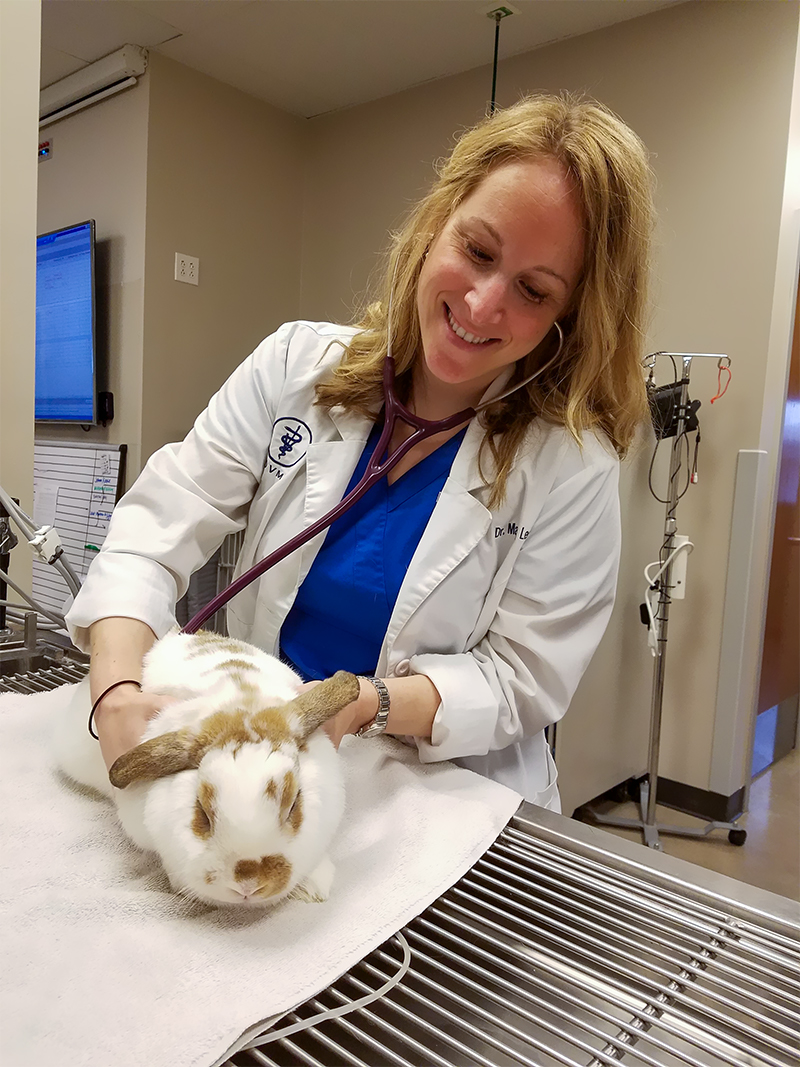Rabbit Care Information and Resources
Is My Rabbit Sick?
Being prey animals, rabbits instinctually hide their injuries and illnesses until they’re so bad they just can’t hide them anymore. That’s why as rabbit caretakers, it’s imperative we know our rabbit’s habits and behaviors so we can detect the slightest change, which can be an indication that they’re sick or injured.
The following items on this page are some of the common medical issues that you should be aware of when living with a house rabbit.
One of the most common questions we get from new adopters is, “Is my rabbit sick?” If your rabbit is exhibiting any of the signs or symptoms below, the answer is a very possible yes, and you should contact your rabbit-savvy veterinarian immediately to be sure.
For more information on a variety of rabbit health concerns, visit House Rabbit Society’s Rabbit Health Resources Page.
Is My Rabbit Sick?
Gut Stasis
Gut Stasis, also known as G.I Stasis, or Gastrointestinal Stasis, is one of the most common illnesses in rabbits. Thankfully, it’s also one of the easiest conditions to treat if it’s caught early on, but it can be fatal if it isn’t treated quickly.
There are a variety of causes such as poor diet, stress, dental problems, dehydration, etc. And the most obvious symptoms of gut stasis are when your rabbit stops eating or drinking, if their temperature is below 100.5F, and/or they’re in a hunched, or cramped position.
If you see any of these or the other signs (listed in the more in-depth article linked on the right), you need to call your veterinarian asap.
Gut stasis is not something that will just “go away”, and taking quick action will save your bunnies life.
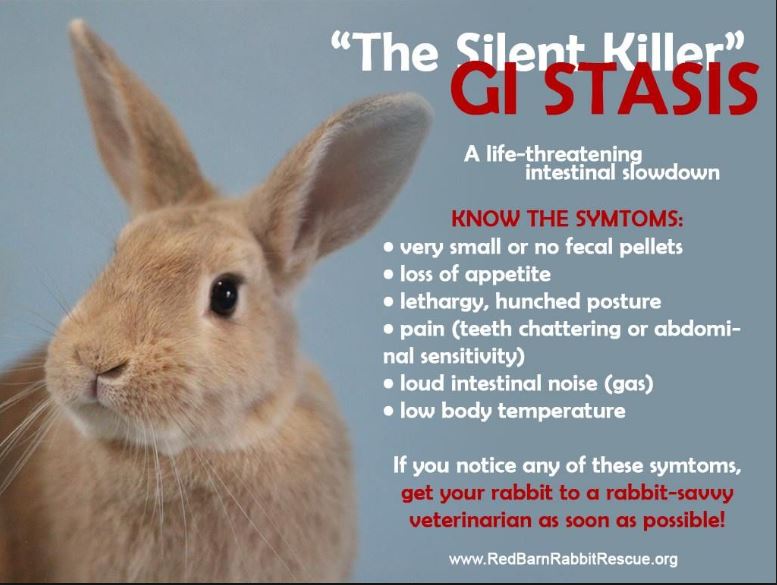
More Gut Stasis Information and Resources:
GastroIntestinal Stasis, The Silent Killer-H.A.R.E by DVM Dr. Dana Krempels
Is My Rabbit Sick?
Dental Problems
Rabbits’ teeth grow continuously throughout their lifetime, and their constant chewing of fibrous foods helps wear them down and keep them in good shape.
However, sometimes the teeth can be misaligned. This condition is known as malocclusion, which means that a rabbit’s constantly-growing teeth are not wearing down properly. If the misalignment is bad, the teeth will need to be clipped, dremeled or removed so that the rabbit can eat. Usually, malocclusion just strikes the front teeth, but occasionally, the back teeth can also be misaligned. One indication of this is a wet chin that is caused by drooling.
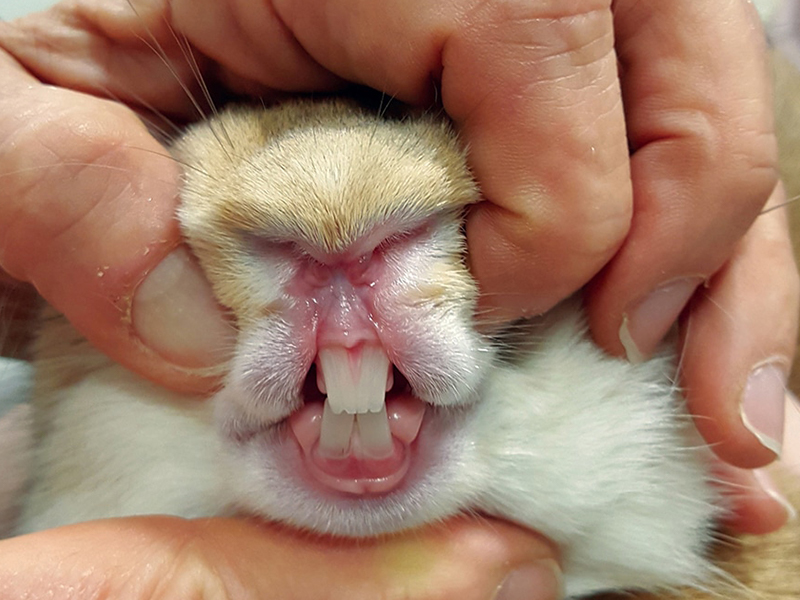
Learn More About Rabbit Dental Health and Conditions
When Teeth Turn to Tusks by House Rabbit Society
Dental Disease in Rabbits: A Simple Overview
by Dana Krempels, Ph.D.
Is My Rabbit Sick?
Bacterial Problems
The first indication of an infection may be a runny nose or eye, sometimes a high temperature, sometimes a rattling sound from the lungs, or (rarely) a coughing sound. Do not dismiss these signs as a “common cold”, rabbits don’t get common colds.
It is important to see your veterinarian as soon as the first symptoms of any infection appear, as they are more easily cured when caught in the early stages, and much less stressful to the rabbit.
The bacteria you may hear the most about is called Pasteurella. This used to be a major problem, but with the newer antibiotics, and even a new vaccine recently on the market, this bacteria can often be eliminated. And, if not totally eliminated, it can be controlled with the use of long term antibiotics.
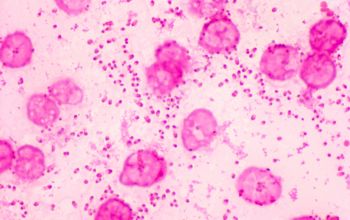
Read More about what a Runny Nose could mean in your rabbit:
“Runny Eyes, Runny Nose: What Do They Mean?”-House Rabbit Society
Most of the symptoms described are quite common for many types of bacteria, so it is important to have your veterinarian do a culture to determine exactly what is being treated. Find out more here.
Is My Rabbit Sick?
Head Tilt
Head Tilt in rabbits is a surprisingly common condition, and that may be because the illness can be caused by many different factors.
While a bunny with head tilt looks like a very sad, hopeless sight, many head tilt bunnies who are seen by a rabbit-savvy vet and whose condition stabilizes go on to live perfectly healthy, happy lives. So don’t despair, but if you begin to see your rabbit’s head begin to tilt, take them to the vet IMMEDIATELY. The earlier the diagnosis, the better chance of either recovery or healthy stabilization of the condition.
Please understand head tilt needs to be taken very seriously. Your rabbit-savvy vet will need to see the rabbit the moment they start showing symptoms so that the vet can identify the cause and begin the correct treatment.
Possible causes of head tilt (also known as torticollis or wry neck) are:
- Middle/inner ear infection (otitis media /interna)
- Encephalitozoon cuniculi (a protozoan parasite)
- Stroke (cerebrovascular accidents)
- Trauma
- Cancer (neoplasia)
- Cervical muscle contraction
- Cerebral larva migrans
- Intoxication
Treatment of Head Tilt will be entirely based on what your rabbit-savvy veterinarian finds to be the root cause of the head tilt. That is why it’s so important you get your rabbit to the vet asap. Take a look at the resources to the right for more in-depth explanations of the issue in general as well as the causes and treatments based on the cause.
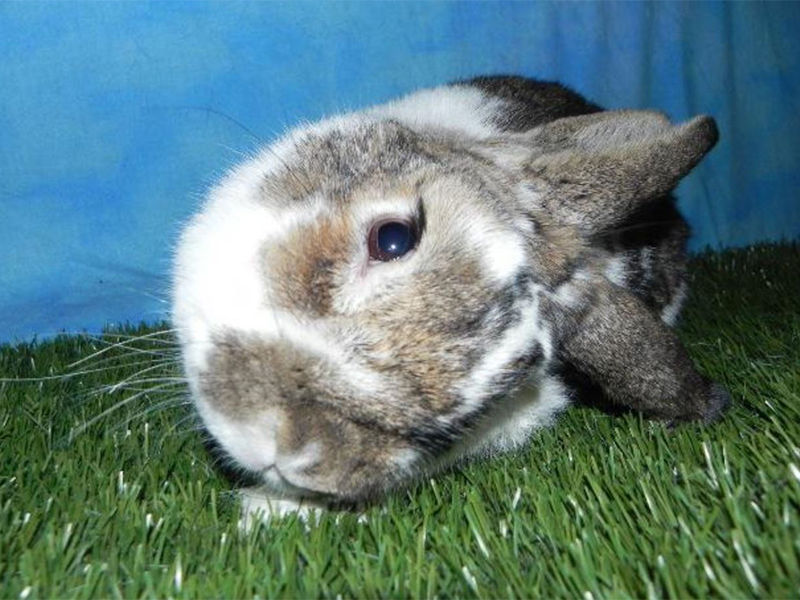
The above photo is of HRRN Alumni Romeo came to HRRN after he was brought to the vet with Head Tilt, and his owners wanted to euthanize him due to not wanting to pay for treatment. The vet saw that Romeo could have a good quality of life still and contacted us. We took him in and he was adopted and lived happily and comfortably for many more years.
Learn More About Head Tilt Causes, Symptoms, and Treatments:
Head Tilt: Causes and Treatment-House Rabbit Society
Head Tilt in Pet Rabbits by Susan Brown, DVM-VeterinaryPartner.com
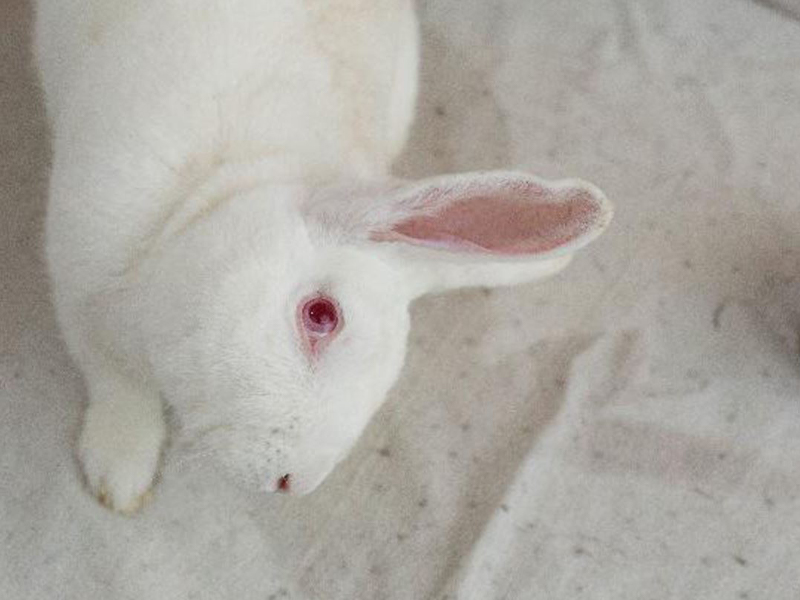
Is My Rabbit Sick?
Abscesses
An abscess is a walled-off pocket of infection, which contains harmful bacteria. The body does this to protect itself and to stop the infection from spreading. Abscesses are fairly common in house rabbits and can occur anywhere in the body.
However, the most common places for abscesses to occur are on the head, neck, or a place on the skin where a wound has happened (like from surgery or a bite wound). Abscesses forming on the head or neck are frequently secondary to a dental or nasolacrimal duct (tear duct) problem.
Your rabbit may have an abscess if you find a semi-hard lump on any of the places mentioned above. Once the underlying cause of the abscess is found, your rabbit-savvy veterinarian can then begin treatment to heal the abscess. Abscesses are treatable, but that makes them no less serious. Abscesses on rabbits do not just go away. Finding any lump on your rabbit warrants a trip to the veterinarian immediately.
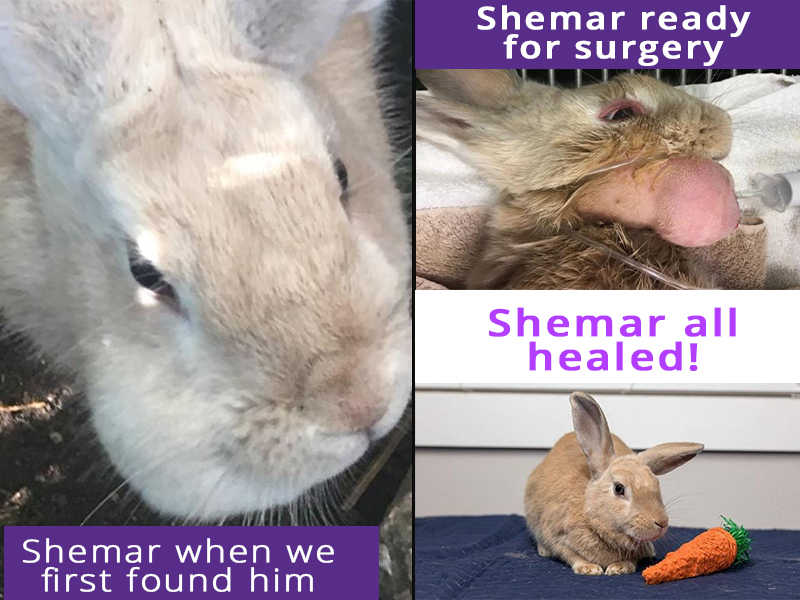
Learn More About Abscesses Causes, Symptoms, and Treatments:
Is My Rabbit Sick?
Urine Sludge or Red Urine
Rabbit Urine Color:
Most rabbit caretakers are startled when they first see the color of their rabbit’s urine, because it can be a variety of colors ranging from clear, to yellow, to brown, to bright red.
This wide range of colors is completely normal. You should be alarmed if you see your rabbit sitting and straining to urinate, the urine has a thick, sludgy texture, or there is loss of appetite.
If you see red urine, don’t panic. It’s usually perfectly normal. If in doubt, you can have your veterinarian test to see whether there is blood in the urine.
Bladder Sludge:
Bladder sludge, also called hypercalcinuria or hypercalciuria, is a thickening of the urine with calcium salts. Bladder sludge can be comprised of any number of calcium salts and doesn’t allow the urine to flow as it normally should.
Sludge can have the consistency of chalk, fine sand, or even toothpaste. When felt, this sludge can be smooth, have a fine, granular texture, or even have a gritty texture. Sludge can form in the kidneys or ureters, but is normally found in the bladder. If you see your rabbit has urine sludge, have your rabbit-savvy veterinarian check to make sure everything is alright internally and if there are things you can do at home to help lessen the sludge (filtered water, diet change, etc.).
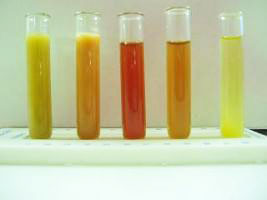
Is My Rabbit Sick?
Diarrhea
Diarrhea is not a normal or common occurrence in house rabbits. But, that doesn’t mean it doesn’t happen. Many inexperienced caretakers overlook diarrhea as a passing thing, to the detriment of the rabbit.
Diarrhea is a serious condition in rabbits and needs a veterinarian’s immediate attention. When we say diarrhea, we mean liquid feces. It does not mean soft pills or cecal droppings. Rabbits with diarrhea dehydrate rapidly.
Dehydration is a threat to a rabbit’s survival. In short, if your rabbit has diarrhea, you must get them to a rabbit-savvy veterinarian.
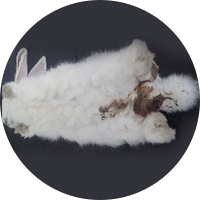
Find a Rabbit-Savvy Veterinarian Near You
